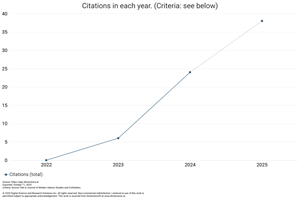The Quran and Restoration of Education
DOI:
https://doi.org/10.59653/jmisc.v2i02.750Keywords:
al quran, islamic education, pedagogical approaches, curriculum integration, theologyAbstract
This paper explores pedagogical approaches to teaching Al-Qur'an in Islamic schools. It examines various methods and strategies employed by educators to effectively impart the teachings of Al-Qur'an to students within the context of Islamic education. The study delves into the importance of integrating Al-Qur'an into the curriculum and discusses the challenges and opportunities associated with teaching Al-Qur'an in Islamic schools. Additionally, it highlights the role of teachers in implementing pedagogical approaches that engage students and foster a deeper understanding and appreciation of Al-Qur'an. The findings of this paper contribute to the ongoing discourse on enhancing the quality of Islamic education through innovative pedagogical.
Downloads
References
Abdul-Rauf, M. (2019). "The Impact of Quranic Teachings on the Spiritual Development of Students: A Case Study of Islamic Schools in Malaysia." Journal of Education and Practice, vol. 10, no. 3, pp. 15-25.
Adisel, A., Hazayimun, H., Robbyansa, I., & Prananosa, A G. (2022, June 30). Realisasi Pembelajaran Pendidikan Islam dalam Sistem Pendidikan Nasional Pada Satuan Pendidikan Sekolah Dasar. https://doi.org/10.31539/joeai.v5i1.3601
Ahsan, M. T. (2020). "Integration of Islamic Education with Modern Curriculum in Bangladesh: Challenges and Opportunities." International Journal of Islamic Education, vol. 2, no. 1, pp. 42-54.
Al-Attas, S. M. N. (2001). "Islam and Secularism." Kuala Lumpur: International Institute of Islamic Thought and Civilization.
Al-Attas, S. N. (2001). "The Concept of Education in Islam: A Framework for an Islamic Philosophy of Education." International Institute of Islamic Thought and Civilization (ISTAC).
Al-Qur'an. Terjemahan dan Tafsir oleh Departemen Agama RI.
Amin, M. S., & Mamat, I. (2018). "The Challenges of Implementing Islamic Education in the Malaysian Public School System." International Journal of Academic Research in Business and Social Sciences, vol. 8, no. 8, pp. 877-886.
Amrullah, A. (2022, June 7). Integration of Islamic Moderation Values on Islamic Education Learning Material at Madrasah Aliyah Level. AJIS: Academic Journal of Islamic Studies, 7(1), 27-27. https://doi.org/10.29240/ajis.v7i1.4284
Badawi, J. A. (2015). "Holistic Education in the Light of Islamic Teachings: A Conceptual Framework." Journal of Education and Practice, vol. 6, no. 22, pp. 139-146.
Hamid, S. (2019). "Holistic Approach to Islamic Education: A Case Study of Islamic Schools in Malaysia." Journal of Islamic Education Research, vol. 3, no. 2, pp. 87-98.
Hasan, M. (2020). "The Role of Quranic Education in Developing Critical Thinking Skills: A Case Study of Islamic Schools in Malaysia." Journal of Islamic Education, vol. 8, no. 1, pp. 45-58.
Hashim, R. (2015). "Teaching and Learning with Al-Qur'an: A Holistic Approach in Islamic Education." International Journal of Education and Research, vol. 3, no. 12, pp. 329-342.
Huda, Nurul. "Integrating Islamic Values into the Curriculum: A Case Study of an Islamic School in Indonesia." Journal of Islamic Education, vol. 1, no. 1, 2016, pp. 25-39.
Jamil, S., & Matondang, A Y. (2017, August 8). The Education Toughts of Sayyid Quthb in The Tafsir of Zilal al Quran. Intenational Journal on Language, Research, and Education Studies. http://jurnal.uinsu.ac.id/index.php/ijlres/article/view/941/734
Khan, M. A. (2017). "Challenges and Opportunities in Teaching Islam in Public Schools: A Case Study of the United States." Journal of International Social Studies, vol. 7, no. 1, pp. 60-72.
Nakib, O. (2015, July 27). The Nature of the Aims of Education: Quranic Perspectives. Al-bayan journal of Quran and hadith studies, 13(1), 25-46. https://doi.org/10.1163/22321969-12340016
Naqiyah, N. (2021, June 4). Tafseer Study on Qurân Reading in the Tradition of the Banyumas Muslim Community. Ibda' : Jurnal Kajian Islam dan Budaya, 19(1), 190-204. https://doi.org/10.24090/ibda.v19i1.4719
Nasir, Mohamad. "The Integration of Islamic Values in the Curriculum: The Malaysian Experience." Journal of Education and Practice, vol. 7, no. 3, 2016, pp. 95-102.
Rahman, A. (2021). "Integrating Quranic Values into Education: A Framework for Character Building." International Journal of Educational Psychology and Counseling, vol. 3, no. 2, pp. 87-102.
Sagala, Saeful. "Islamic Education in Indonesia: The Integration of Islamic Values in the National Curriculum." International Journal of Education and Research, vol. 2, no. 12, 2014, pp. 1-10.
Siddiqi, M. N. (2017). "Holistic Education in Islam: An Approach to Comprehensive Development." Journal of Educational and Social Research, vol. 7, no. 1, pp. 53-58.
Yusuf, A. (2018). "The Influence of Qur'anic-Based Education on Student Character Formation: A Case Study." Journal of Islamic Education Studies, 3(2), 78-92.
Downloads
Published
How to Cite
Issue
Section
License
Copyright (c) 2024 Andry Setiawan, Andewi Suhartini

This work is licensed under a Creative Commons Attribution-ShareAlike 4.0 International License.
Authors who publish with this journal agree to the following terms:
- Authors retain copyright and grant the journal right of first publication with the work simultaneously licensed under a Creative Commons Attribution-ShareAlike that allows others to share the work with an acknowledgement of the work's authorship and initial publication in this journal.
- Authors are able to enter into separate, additional contractual arrangements for the non-exclusive distribution of the journal's published version of the work (e.g., post it to an institutional repository or publish it in a book), with an acknowledgement of its initial publication in this journal.
- Authors are permitted and encouraged to post their work online (e.g., in institutional repositories or on their website) prior to and during the submission process, as it can lead to productive exchanges, as well as earlier and greater citation of published work (See The Effect of Open Access).
























